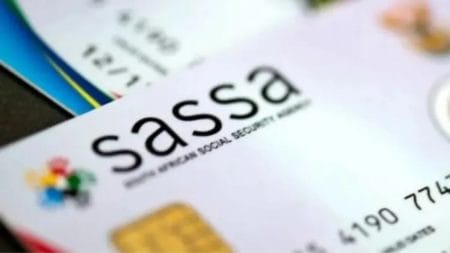On Thursday, South Africa’s Finance Minister, Enoch Godongwana, sought to clear the air during a session in the National Assembly, addressing concerns surrounding the future of the Social Relief of Distress (SRD) grant, which is administered by SASSA (South African Social Security Agency). The Minister confirmed that there are no plans to terminate the SASSA SRD Grant, despite widespread speculation and concerns about its future.
Key Points from Minister Godongwana’s Statement
Minister Godongwana reassured parliamentarians and the public that the government had no intention of discontinuing the SASSA SRD Grant. He said, “What I want to assure the House on is that there is no intention to terminate the grant.” His response came in light of growing rumors and misinformation surrounding the SRD grant, which has become a critical support mechanism for millions of South Africans facing financial hardships due to the economic fallout of the COVID-19 pandemic.
Since its introduction in 2020, the SASSA SRD Grant has provided much-needed relief to individuals who have found themselves unemployed or in distress. However, with the government’s ongoing fiscal challenges, particularly after a court ruling acknowledging that the SASSA SRD Grant has become financially burdensome, the future of the grant has been called into question.
Despite these challenges, Godongwana assured the public that the government is committed to keeping the SASSA SRD Grant operational, though its structure may evolve. The Minister mentioned that discussions were underway to explore the possibility of transitioning the SASSA SRD Grant into a more employment-oriented initiative.
Related: SASSA SRD Grant: How Often Do I Need to Reapply in 2025?
A Shift Toward Employment-Focused Support?
Although the government has no plans to eliminate the SASSA SRD Grant, Godongwana noted that it could evolve into an Employment Grant or Jobseekers Grant as part of a broader effort to tackle South Africa’s high unemployment rate. The shift toward an employment-focused grant would align with the government’s broader strategy to promote job creation and incentivize active participation in the labor market.
“There may well be that this grant could emerge as an employment grant. I don’t know, but if colleagues have some proposals, they must all approach the Employment and Labour Minister, Nomakhosana Meth, who is leading us in that regard,” said Godongwana during the National Assembly session.
The potential transformation of the SASSA SRD Grant into an Employment or Jobseekers Grant comes as the government seeks to address the country’s chronic unemployment crisis. South Africa’s unemployment rate currently stands at a staggering 42%, one of the highest in the world, and job creation remains a critical focus in the government’s economic recovery plans.
Budget Allocations and Fiscal Responsibility
The SASSA SRD Grant continues to be a significant part of South Africa’s social welfare expenditure. The 2025/26 Budget allocated R235 billion to the SRD grant. This substantial budget allocation underscores the importance of the grant in supporting millions of South Africans. However, the continued availability of the SASSA SRD Grant depends on the outcome of the ongoing discussions about the government’s labor market reforms.
Since its introduction in 2020, the government has spent approximately R35 billion on the SASSA SRD Grant. This funding has provided vital financial support to individuals struggling to meet basic needs. However, Godongwana pointed out that the future of the SRD grant, including its potential transformation into a new form, is still subject to discussions within the government.
He also highlighted the government’s broader fiscal efforts to support employment, mentioning the Employment Incentive Tax, which helps fund employers who hire young people. This initiative alone has seen the government invest around R30 billion, demonstrating the government’s commitment to creating jobs and reducing unemployment.
The Debate on Unemployment Grants
During the National Assembly session, there was considerable debate about the possibility of introducing an unemployment grant to combat the country’s high unemployment levels. Democratic Alliance (DA) MP Mark Burke raised concerns about the costs associated with job-seeking and the financial barriers that unemployed people face in finding work. In response, Godongwana mentioned that the government has been considering the introduction of a job seeker’s grant as part of a broader employment support package.
The issue of unemployment was also raised by Economic Freedom Fighters (EFF) MP Omphile Maotwe, who questioned why the National Treasury had not introduced an unemployment grant to address the high levels of joblessness, especially among graduates. Maotwe argued that many South Africans were unemployed not because they lacked the skills but due to the absence of employment opportunities.
Godongwana responded by stating that it was the first time he had heard of a specific proposal for an unemployment grant. However, he acknowledged that discussions about a Basic Income Grant (BIG) had been ongoing, with some advocating for its introduction as a means to provide broader social support to unemployed South Africans.
Addressing the Root Causes of Unemployment
Minister Godongwana stressed that addressing South Africa’s unemployment crisis requires more than just direct financial grants. He emphasized the importance of a multi-faceted approach to job creation, including significant investments in infrastructure, support for small and medium enterprises (SMEs), and targeted labor market interventions.
“As part of our four pillars of growth in the Budget, we are making massive investments in infrastructure, which we believe will have a long-term impact on economic growth and job creation,” said Godongwana. The finance minister added that these investments are key to creating sustainable employment opportunities in the future.
The ongoing work by Minister Nomakhosana Meth in the Department of Employment and Labour to review labor market reforms and evaluate the future of employment-related grants is critical to shaping South Africa’s economic recovery. The government is exploring various options, including entrepreneurial grants and other initiatives aimed at empowering the youth and unemployed individuals.
The Future of the SASSA SRD Grant
The future of the SASSA SRD Grant is uncertain but remains crucial for many South Africans. While the grant is unlikely to be terminated, its structure and purpose may evolve to better address the needs of the country’s unemployed population. Minister Godongwana’s reassurances provide some comfort, but the details of any proposed changes will become clearer as the government continues its discussions on labor market reforms.
The SASSA SRD Grant has played a vital role in alleviating poverty and providing a safety net for vulnerable South Africans. As the government seeks to balance fiscal responsibility with the need for job creation and economic recovery, the future of the grant, in whatever form it may take, will remain a significant part of the conversation.
Conclusion: A Balancing Act Between Relief and Job Creation
While South Africans can rest assured that there are no immediate plans to end the SASSA SRD Grant, the government is exploring ways to transition it into a more employment-focused initiative. The evolving nature of the grant highlights the government’s broader commitment to addressing unemployment and creating long-term job opportunities.
As discussions continue, the future of the SASSA SRD Grant will remain an important topic, especially as South Africa works to recover from the economic challenges exacerbated by the COVID-19 pandemic.
Source: The Star










